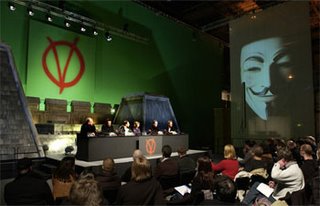NCAA Fans: Add 'Vendetta' To Your Netflix Queue
 It's too bad Warner Brothers released V For Vendetta during the NCAA tourney, and it's too bad most critics are so unenthusiastic. The most likely V appreciators were busy watching hoops last weekend and will be for the next two weekends. And the lukewarm reviews will prevent any buzz the movie would need to draw people to theaters after that. But to anyone who stops analyzing Sweet 16 brackets long enough to see this, you should go save V For Vendetta in your Netflix queue now.
It's too bad Warner Brothers released V For Vendetta during the NCAA tourney, and it's too bad most critics are so unenthusiastic. The most likely V appreciators were busy watching hoops last weekend and will be for the next two weekends. And the lukewarm reviews will prevent any buzz the movie would need to draw people to theaters after that. But to anyone who stops analyzing Sweet 16 brackets long enough to see this, you should go save V For Vendetta in your Netflix queue now. V is about a liberator/terrorist in a futuristic, police-state London whose goal is to tear down the establishment. The story sets up the establishment and the motivation for the vendetta and then allows for the viewer to decide whether the protagonist is liberator or terrorist. The dialog flows smoothly (a welcome improvement over the last 2 Matrix installments) and, for such serious subject matter, they get their point across with just the right hints of levity.
V is a smart and entertaining movie that's well worth your time, despite the lukewarm analysis from critics like Owen Gleiberman from Entertainment Weekly and his self-proclaimed idol David Denby from The New Yorker. Gleibermann dumbed V down to a "rage against the machine by the machine," claiming that it's just one other example of how "fight-the-power anarchy is now marketed as a fashionable identity statement."
Denby took his usual intellectual superiority angle, saying that V "not so much imitated as pillaged" George Orwell's 1984.
Neither critic had much to say about the relevance of the story in today's America; about how conservative, pious leaders can create governments and societies where rights like freedom of expression are slowly and subtly taken away (doesn't anyone remember that you have to sign a loyalty oath to attend a Bush Q&A meeting?). And most notably, neither critic talked about the government's control of the media -- a key theme of the movie.
As for Gleiberman's beef, my response is that 'fight-the-power' is a cornerstone of freedom and the basis for Democracy. So as long as large media companies like Warner Brothers have enough balls to mass-market this mindset, I am all for it. Better that then letting conservative leadership slowly chip away at their right to put out material like V.
I have a similar response to Denby's problem with V's influences. There are lots of people -- yes Mr. Denby, even smart people -- who will never read 1984, so if an intelligent movie can get them thinking about the nature of power and propaganda and government, then fine. As long as the greatest number of people get the message.
It's so rare that a big studio takes a chance on these issues, so I am glad that V got the high-budget treatment that it did. And like The Economist said: "Only fans of detention centeres, torture, unfettered government surveillance, screaming-mad television pundits and laws against alternative lifestyles will find anything [in V] that could possibly offend."
So I predict -- and hope -- that V will gain more traction when it moves from the theaters to DVD and beyond.

